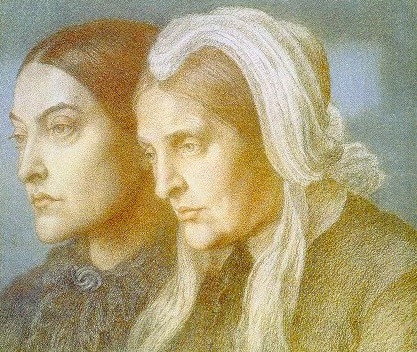Christina Rossetti, selected poems Contents
- Social / political context
- Religious / philosophical context
- Literary context
- A Better Resurrection
- A Birthday
- A Royal Princess
- At Home
- Cousin Kate
- Despised and Rejected
- Echo
- Goblin Market
- Good Friday
- Jessie Cameron
- L.E.L
- Maude Clare
- Remember
- Shut Out
- Song (When I am dead, my dearest)
- Summer is Ended
- The Convent Threshold
- The Lowest Place
- To Lalla, reading my verses topsy-turvy
- Twice
- Up-hill
- Winter: My Secret
Birth, upbringing and education: 1830 - 1845
Italian exiles
Christina Rossetti was born in London on December 5th 1830. She was the fourth child of Gabriele Rossetti, an Italian poet and political exile and Frances Mary Lavinia Polidori, the daughter of an Italian exile. She had two brothers, William Michael and Dante Gabriel and one sister, Maria.
Early influences
 As a teacher of Italian at Kings College, London, Gabriele Rossetti entertained many scholars and writers at his home. His children grew up speaking both Italian and English and were encouraged to appreciate art and literature. Gabriele taught and wrote a book on Dante’s writings and introduced his children to the work of the medieval poet.
As a teacher of Italian at Kings College, London, Gabriele Rossetti entertained many scholars and writers at his home. His children grew up speaking both Italian and English and were encouraged to appreciate art and literature. Gabriele taught and wrote a book on Dante’s writings and introduced his children to the work of the medieval poet.
More on Dante: Dante Alighieri was born in 1265 and died in 1321. He had a very active early adulthood which saw him fall passionately in love and involve himself in the politics of his native city, Florence. In 1301, he was exiled from Florence for his beliefs and lived the rest of his life in Rome.
During his time in exile, he wrote The Divine Comedy. This was written in a form of poetic verse called terza rima, which Christina Rossetti often uses in her own poetry. It describes Dante's journey through hell, purgatory and paradise, guided first by the Roman poet Virgil and then by Beatrice, the subject of his love. It has gone on to become one of the most significant books in Western literature. Between 1875 and 1876, Rossetti attended a course of lectures on Dante at University College London. And also wrote two magazine articles about Dante.
Education
Frances educated Maria, Gabriel, William Michael and Christina at home. In the 1830s and 1840s, when Christina Rossetti was growing up, school education was not compulsory. It was not until 1870 that an education act was created and all children under the age of 12 were required to attend school. Rossetti and her siblings were fortunate enough to have well-educated parents who believed in encouraging girls in their reading and writing skills. However, many were less fortunate (for more information on education in Victorian England see The world of Victorian writers > Education in Victorian England).
The Rossetti children were all avid readers and writers. They especially enjoyed reading The Tales of Arabian Nights and playing ‘bouts rimes’, a sonnet writing competition that Rossetti describes in her short story, Maude: A story for girls which she wrote in 1850 when she was 20.
More on bouts rimes: Bouts rimes are words or syllables, often given as rhymes at the end of each line of a sonnet. In the game that the Rossetti children enjoyed, these words or syllables would first be decided and then the other parts of the lines were supplied by each player in a race against time.
City and country life
As children growing up in the increasingly industrialised city of London (see The world of Victorian writers > The impact of industrialisation), Rossetti and her siblings enjoyed frequent trips to their maternal grandfather’s house in Holmer Green in Buckinghamshire. Here, they were surrounded by orchards and a variety of animals not to be found in the city. Rossetti reflects on her own childhood in her 1872 volume of poetry, Sing-Song: A Nursery Rhyme Book. Here, she gives the impression that it was both full of opportunities to appreciate the beauty of Nature, but also tinged with sadness as she recognises that childhood is a time when an awareness of death first develops. This awareness is significant when considering Rossetti’s poems about death. In the mid nineteenth-century, it is likely that most children would have watched at least one sibling, if not parent, die. Without the knowledge about the spread of germs that we have today, disease spread rapidly and the child mortality rate was high.
Mother and daughter
 All of Rossetti’s books of poetry were dedicated to her mother, with whom she lived all her life. She acknowledges the shaping influence that her mother Frances had on her life and work, in a sonnet she wrote for her. She used this sonnet to preface her fourth volume of poetry, A Pageant and Other Poems:
All of Rossetti’s books of poetry were dedicated to her mother, with whom she lived all her life. She acknowledges the shaping influence that her mother Frances had on her life and work, in a sonnet she wrote for her. She used this sonnet to preface her fourth volume of poetry, A Pageant and Other Poems:
I learnt love-lore that is not troublesome;
Whose service is my special dignity,
And she my loadstar while I go and come.
(Sonnets are full of love, lines 5-8)
